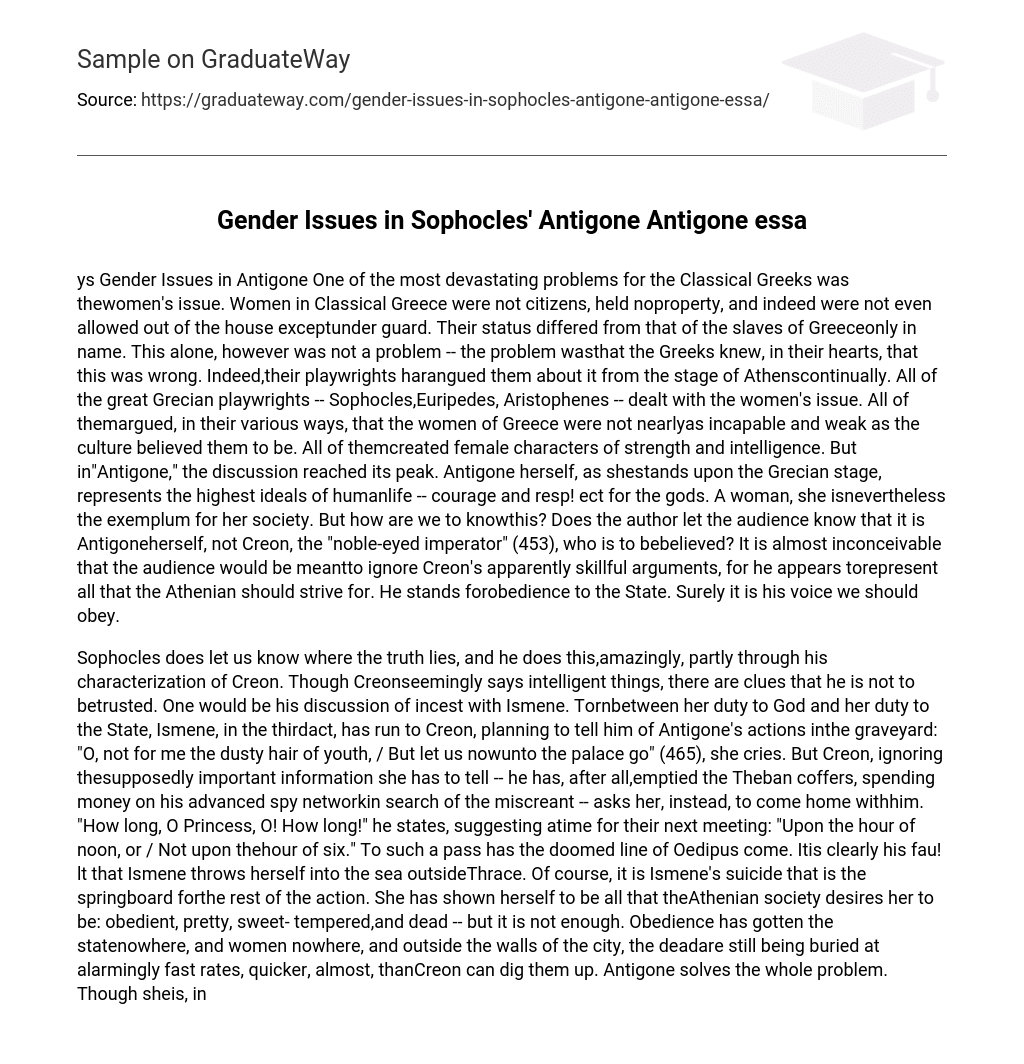ys Gender Issues in Antigone One of the most devastating problems for the Classical Greeks was thewomen’s issue. Women in Classical Greece were not citizens, held noproperty, and indeed were not even allowed out of the house exceptunder guard.
Their status differed from that of the slaves of Greeceonly in name. This alone, however was not a problem — the problem wasthat the Greeks knew, in their hearts, that this was wrong. Indeed,their playwrights harangued them about it from the stage of Athenscontinually. All of the great Grecian playwrights — Sophocles,Euripedes, Aristophenes — dealt with the women’s issue. All of themargued, in their various ways, that the women of Greece were not nearlyas incapable and weak as the culture believed them to be.
All of themcreated female characters of strength and intelligence. But in”Antigone,” the discussion reached its peak. Antigone herself, as shestands upon the Grecian stage, represents the highest ideals of humanlife — courage and resp! ect for the gods. A woman, she isnevertheless the exemplum for her society. But how are we to knowthis? Does the author let the audience know that it is Antigoneherself, not Creon, the “noble-eyed imperator” (453), who is to bebelieved? It is almost inconceivable that the audience would be meantto ignore Creon’s apparently skillful arguments, for he appears torepresent all that the Athenian should strive for.
He stands forobedience to the State. Surely it is his voice we should obey. Sophocles does let us know where the truth lies, and he does this,amazingly, partly through his characterization of Creon. Though Creonseemingly says intelligent things, there are clues that he is not to betrusted. One would be his discussion of incest with Ismene.
Tornbetween her duty to God and her duty to the State, Ismene, in the thirdact, has run to Creon, planning to tell him of Antigone’s actions inthe graveyard: “O, not for me the dusty hair of youth, / But let us nowunto the palace go” (465), she cries. But Creon, ignoring thesupposedly important information she has to tell — he has, after all,emptied the Theban coffers, spending money on his advanced spy networkin search of the miscreant — asks her, instead, to come home withhim. “How long, O Princess, O! How long!” he states, suggesting atime for their next meeting: “Upon the hour of noon, or / Not upon thehour of six.” To such a pass has the doomed line of Oedipus come. Itis clearly his fau! lt that Ismene throws herself into the sea outsideThrace. Of course, it is Ismene’s suicide that is the springboard forthe rest of the action.
She has shown herself to be all that theAthenian society desires her to be: obedient, pretty, sweet- tempered,and dead — but it is not enough. Obedience has gotten the statenowhere, and women nowhere, and outside the walls of the city, the deadare still being buried at alarmingly fast rates, quicker, almost, thanCreon can dig them up. Antigone solves the whole problem. Though sheis, indeed, like Ismene, both pretty and dead at the end, shenevertheless provides a clear example of what women can do when theyare trusted with power, rather than kept at home. For it is her newlyformed women’s rights group, based on the Lysistratan model, whichcreates the only solution to the Theban problem.
Though Antigoneherself is dead by the time the group comes up with their stunninglysimple plan, it it her legacy which informs the decision. “Not uponthe dead nor yet / Upon the living base thy worth” (521), the Thebanwomen cry, and upon their creation of a new burial ground, neitherwithin the city, nor without, but within the walls of the city itself,they alone stop the civil war which threatens Thebes. Their ingenioussolution provides a liminal space for the disgraced family of the lateking, Oedipus. And the final scene, wherein the entire family joinsAntigone, buried within the walls of Thebes, creates ! a physicalmetaphor of bonding and solidity. The traitor brother Polynices, thedepressed sister Ismene, the political firebrand Antigone, joined withtheir uncle Creon and their hot-tempered cousin and his mother, all aretogether at last in harmony, united in the purpose of the defense oftheir beloved city against the Spartan onslaught, a sort of spiritualand physical mortar to the defensive structure.
It is no wonder thatAntigone, the prize winner of the Athenian festival in which it wasperformed, captured not only the prize but also the hearts of theAthenians. Clearly, they recognized themselves in the stage city ofThebes, and recognized as well the importance of the message of theplay, and its relevance to their own situation. And indeed, had it notbeen for the movement which followed the production of the play, inwhich the Athenian women were liberated from their near-slave status,Athens would most probably have lost the war with Sparta. Only thenewly liberated women of Athens, bedecked with citizen status,womanning the walls of Athens, kept the Spartans out, in the lastbattle of the war, in a stirring reproduction of the end scene ofAntigone, this time with live, rather than dead, defenders. The playprovides us with a useful example of the importance of literature tosociety, and an important message for our own time.





